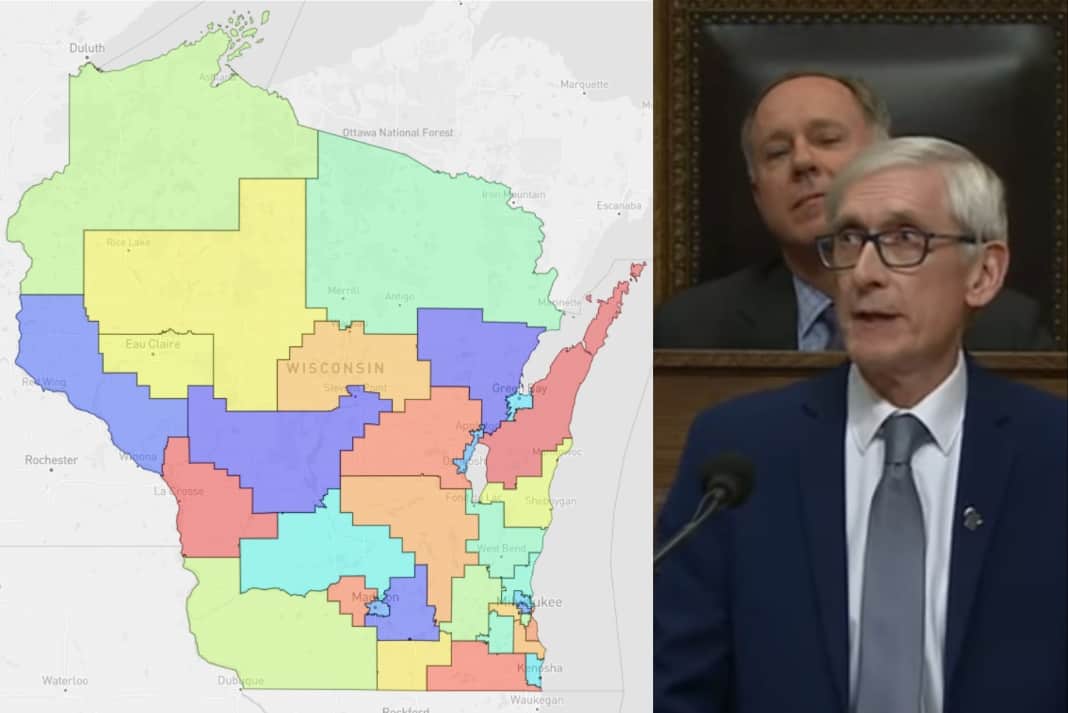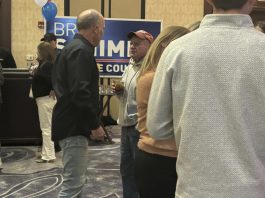There is major – and sudden – movement expected on the redistricting maps Tuesday in the Wisconsin Legislature, Wisconsin Right Now can report. A state Senator who authored the bill told Wisconsin Right Now on Monday night that the movement could “resolve the map issue.”
Wisconsin Right Now has learned that the Republican-controlled state Senate will take up a dormant bill on the so-called Iowa redistricting model Tuesday, an unexpected move, and the bill will be going to the floor for a vote. We’ve learned further details that indicate there could be even more explosive movement on the issue Tuesday that goes beyond the Iowa model. The details are still coming together.
It’s all timed for a day already scheduled to feature Gov. Tony Evers’ State of the State.
We contacted state Sen. Dan Knodl, after learning about the movement first from other sources.
“This is an effort to bring the redistricting process forward that we feel the governor will give consideration to which could resolve the map issue,” he said. According to Knodl, the state Senate is “bringing this bill forward to address the redistricting process, which could resolve the map issue.
The movement on the issue comes days after Wisconsin Right Now first broke the fact that the Wisconsin Senate had bottled up the bill in committee, never bringing it to the floor for a vote after an October public hearing, even though Assembly Speaker Robin Vos had three Democratic votes – enough to override a veto by Gov. Tony Evers. We criticized the Senate’s refusal to bring the bill to a vote.
Reminder- Robin Vos had the Democratic votes needed to override Tony Evers’ veto of the Iowa model, which would have given the Republican controlled Legislature some control over the final maps.
But no… Instead, the Republican controlled Senate let it die after public hearing.… pic.twitter.com/VA9T8cSlTa
— Wisconsin Right Now (@wisconsin_now) January 15, 2024
Now it appears that the Senate will be doing exactly that, bringing the bill forward, although that doesn’t mean the vote will deal with the exact same proposal. The bill, as it was first presented, would see the maps drawn by the non-partisan Legislative Reference Bureau. The Legislature would have to vote on the maps. It’s important to remember that the state Constitution gives redistricting authority to the Legislature. The maps ended up in the courts because a new liberal majority flipped on a previous issue regarding municipal islands. However, the court did give the Legislature another chance to draw the maps yet again. Still, Gov. Evers’ agreement is needed – or a veto would need to be overridden.
In September, the Assembly passed the Iowa model for redistricting, which Democrats and Evers had long championed, on a 64-32 vote. It went to the Senate committee, and there was a public hearing on Oct. 19. And there it stayed. Until not.
These notations were added to the legislative calendar at the last minute regarding the bill:
1/22/2024 Sen. Withdrawn from committee on Shared Revenue, Elections and Consumer Protection and rereferred to committee on Senate Organization pursuant to Senate Rule 46(2)(c)
1/22/2024 Sen. Available for scheduling
1/22/2024 Sen. Placed on calendar 1-23-2024 pursuant to Senate Rule 18(1)
The bill was initially bottled up in Knodl’s committee. He told us, “I am the lead author. I am the chair of the committee. I did hear it. I was moving forward with the process. However, I didn’t feel the full Republican caucus was comfortable with going forward with it. Or that I had enough votes in the Republican caucus.”
Knodl said the senate was “continuing to have discussions.”
He said that people are getting “comfortable with a new process that still has legislative oversight” and indicated that he and Senate leadership were “working with them to get them to the right place. Now we’re there.”
The news also comes after Wisconsin Right Now’s investigative reports showing that almost all of the seven sets of maps submitted to the liberal-controlled state Supreme Court would be disastrous for Republicans, likely giving Democrats control of the Legislature. We also reported on the extreme partisanship in Evers’ map submission to the court, as it pits dozens of Republican incumbents against each other, amidst other maneuverings.
However, Evers also has some reason to be concerned, both with the public’s reaction to clearly partisan maps but also the wild card of what two out-of-state consultants will recommend to the court on Feb. 1. Although the consultants were handpicked by the left, one of them, Jonathan Cervas, was involved in drawing a set of maps in New York State that upset Democrats there.
As the New York Times reported in May 2022, “Mr. Cervas’s new maps radically reshaped several districts, scrambling the future of the state’s political establishment for the next decade. Republicans were quietly pleased, and some anti-gerrymandering groups praised his work. But Democrats, who saw several potential pickups in the House of Representatives potentially evaporate, were outraged.”
There is also the fact that Republicans have vowed to appeal to the U.S. Supreme Court. While that requires a federal question, they won before SCOTUS last time, when SCOTUS tossed Evers’ previous map attempt on the basis of how he dealt with race.






![WATCH: Elon Musk Town Hall Rally in Green Bay [FULL Video]](https://www.wisconsinrightnow.com/wp-content/uploads/2022/04/Elon_Musk_3018710552-265x198.jpg)



![The Great American Company [Up Against the Wall]](https://www.wisconsinrightnow.com/wp-content/uploads/2025/03/MixCollage-29-Mar-2025-09-08-PM-4504-265x198.jpg)
![The Wisconsin DOJ’s ‘Unlawful’ Lawman [WRN Voices] josh kaul](https://www.wisconsinrightnow.com/wp-content/uploads/2025/03/MixCollage-29-Mar-2025-08-48-PM-2468-265x198.jpg)
